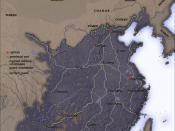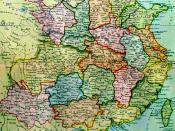Qing Dynasty: also known as the Manchu dynasty, was the last imperial dynasty of China. Ruled from 1644-1912. It was proceeded by ming dynasty and succeed by people's republic of China. Territory extent includes China proper+MMTX. 1. Formation of Manchu State 2 ethnic groups: Tibethan, Mongol, Han, Manchu, and Norterwestern muslims 3. Did not force different ethnic groups to confirm to Manchu customs, allow them to be separate from each other ("trying to be all things to all people")
Tang dynasty: 618-907 AD. Xi'an as capital. Rulers: half han half turick. Open to foreign influence, enforced cosmopolitan. Buddhism took root in China when Xuan Zang visited India and brought back the religious scriptures. Outsiders blamed for the problems.
The tributary system was the traditional Chinese system for managing foreign relations. By establishing the rules and controlling the means and symbolic forms by which foreign countries entered into and conducted their relations with China, and discuss important matters of political, economic, and diplomatic concerns of China.
Korea, the Ryukyu Islands, Vietnam, Thailand, and Burma were "tributary states," which sent regular tribute missions. Tribute often needed to bring expensive gifts when they meet the emperor, and they are requested to get on their knees and bow when they see the emperor, to show their respect.
Treaty of Nanking was the first unequal treaty. Signed in 1842 to mark the end of the Opium War between England, Ireland and China. It was unequal because Britain had no obligations in return. Because China was defeated, Britain warships poised to attack the city, representatives from the British and Qing Empires negotiated aboard HMS Cornwallis anchored at Nanjing. There are three 3 terms: More foreign trade, Reparations and Demobilization (silver and opium), Cession of Hongkong
Unequal treaty: First "Treaty of Nanking". It is unequal...


